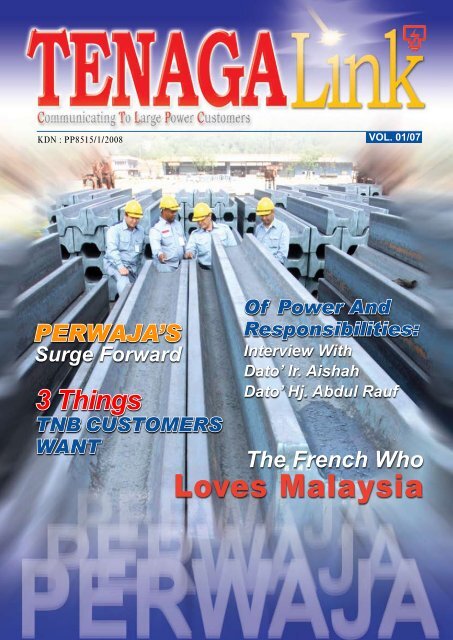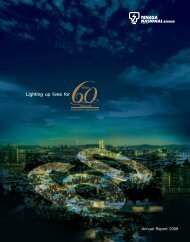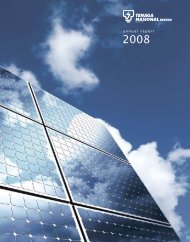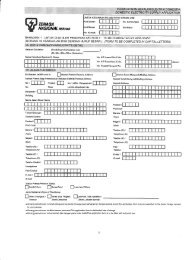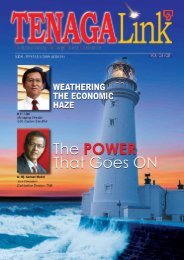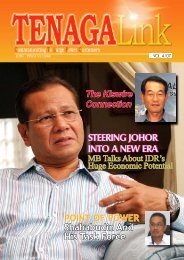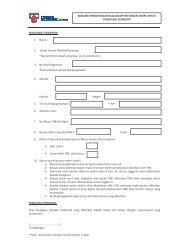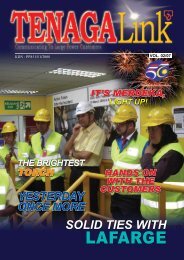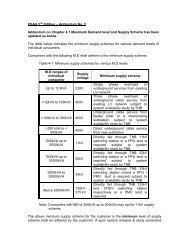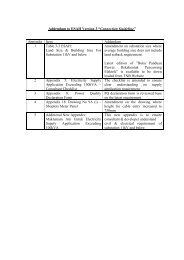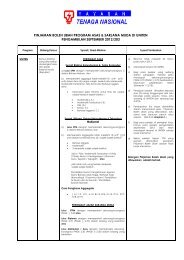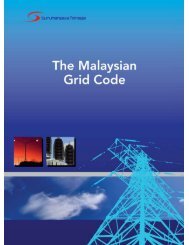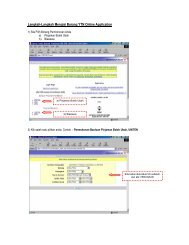Loves Malaysia - Tenaga Nasional Berhad
Loves Malaysia - Tenaga Nasional Berhad
Loves Malaysia - Tenaga Nasional Berhad
You also want an ePaper? Increase the reach of your titles
YUMPU automatically turns print PDFs into web optimized ePapers that Google loves.
KDN : PP8515/1/2008<br />
PERWAJA’S<br />
Surge Forward<br />
3 Things<br />
TNB CUSTOMERS<br />
WANT<br />
VOL. 01/07<br />
Of Power And<br />
Responsibilities:<br />
Interview With<br />
Dato’ Ir. Aishah<br />
Dato’ Hj. Abdul Rauf<br />
The French Who<br />
<strong>Loves</strong> <strong>Malaysia</strong>
CONTENTS<br />
VOL. 01/07<br />
Profile<br />
3 Lighting The Way To Excellence<br />
Cover Story<br />
6 Perwaja: Steely Resolve<br />
Power Bites<br />
10 TNB Activities In Brief<br />
Regional<br />
12 Keeping The Power Going<br />
Tech Charge<br />
15 Electromagnetic Compatibility<br />
Requirement For Semiconductor<br />
Plants<br />
Feature<br />
17 <strong>Malaysia</strong>, My Home<br />
Important Contacts<br />
Dato’ Ir. Aishah bt Dato’ Hj. Abdul Rauf<br />
Vice President (Distribution) TNB<br />
Direct Line : 03-7967 9001<br />
Dato’ Ir. Hj. Amir Nordin bin Abdul Aziz<br />
Senior General Manager (Operation - Region 1)<br />
Direct Line : 03-7967 9295<br />
Ir. Hj. Azman bin Mohd<br />
Senior General Manager (Operation - Region 2)<br />
Direct Line : 03-7967 9105<br />
Hj. Zaharuddin bin Tajul Arus<br />
Senior General Manager (Engineering)<br />
Direct Line : 03-7967 9002<br />
Hajah Zahara bt. Saidin<br />
Senior General Manager<br />
(Meterials Management & Metering Services)<br />
Direct Line : 03-7967 9199<br />
Roslan bin Ab Rahman<br />
General Manager<br />
(Customer Services & Marketing)<br />
Direct Line : 03-7967 9022<br />
Ir. Hj. Mat Riffin bin Omar<br />
General Manager<br />
(Strategic Management & Organizational Development)<br />
Direct Line : 03-7967 9087<br />
Hajah Nazariah bt. Ibrahim<br />
General Manager (Finance)<br />
Direct Line : 03-7967 9095<br />
Ir. Hajah Kamaliah bt. Abdul Kadir<br />
General Manager<br />
(Human Resources Management & Administration Services)<br />
Direct Line : 03-7967 9338<br />
TOWARDS A BRIGHTER FUTURE<br />
Advisor : Dato’ Ir. Aishah Dato’ Hj. Abdul Rauf<br />
Editor : Roslan Ab Rahman<br />
editor’s note<br />
A Trivia for you.<br />
Of all the big <strong>Malaysia</strong>n companies you know, which truly powers the<br />
country forward?<br />
No prizes for guessing folks, it’s TNB.<br />
Apart from literally lighting up the country, it provides energy without<br />
which no other company could function – a hard fact no one can deny.<br />
But as the saying goes, with much power comes a greater responsibility.<br />
That’s why TNB goes out of its way to execute its duties as best it can;<br />
handling clients and others in its charge with much care and utmost<br />
dedication; tending to any problems that may arise as quickly, effectively<br />
and efficiently as possible.<br />
For this, we have received many a prestigious accolade among which<br />
include The Platts Top 250 Global Energy Company Award, Best Investor<br />
Relations Across Asia Award, Asiamoney’s 2nd Best Corporate Governance<br />
in <strong>Malaysia</strong> Award, Deutsche Bank’s Most Improved Company (in terms<br />
of Corporate Governance) Award, the Anugerah Harapan Majikan<br />
Prihatin (Big Corporations Awards) 2005; we have secured the MS ISO<br />
9001:2000 status, and many more.<br />
And we have, you, our Prime users to thank. It is you who have spurred<br />
us on to greater heights and achievements. And we are glad to have<br />
responded accordingly.<br />
In this <strong>Tenaga</strong> Link issue, you will see how two big companies and<br />
Prime users - Perwaja and Seri Pacific Best Western – may have positive<br />
things to say about TNB.<br />
You will also be briefed on the everyday operations of TNB and the<br />
way its staff works, as well as be informed of the seminars and workshops<br />
that have been organised and are being planned, in an effort to bring<br />
consumer and customers closer.<br />
Communications is after all – as Dato’ Ir. Hj. Amir Nordin Abdul<br />
Aziz tells us in an interview – an integral part of ensuring that work runs<br />
smoothly.<br />
Via this publication too, you will get to better understand and familiarise<br />
yourselves with the mission and objectives of <strong>Tenaga</strong>’s Distribution<br />
Division’s Vice President Dato’ Ir. Aishah Dato’ Hj. Abdul Rauf.<br />
Hers is an aspiration that is in line with the vision of TNB President/<br />
CEO Dato’ Sri Che Khalib Mohamad Noh who is all for inculcating an<br />
effective goal-oriented culture in the company, that is underpinned by the<br />
core values of integrity, customer focus, business excellence and caring.<br />
We hope that you would enjoy this issue as much as we did putting this<br />
magazine together.<br />
Yours sincerely,<br />
Editor<br />
Assistant Editors : Syed Hidzam Osman, Hj. Zulkifli Hj. Ahmad<br />
Editorial Advisors : Hj. Zaharuddin Tajul Arus, Ir. Hj. Azman Mohd, Ir. Halim Osman,<br />
Norshila Abdullah, Ir. Nirinder Singh, Nik Najihah Nik Ahmad<br />
Contributors : Marina Mohd Nasir, Melissa Ann Pereira, Safinaz Borhan,<br />
Emilia Rosemera Uzir, Mohd Fuad Faisal, Bahariah Osman,<br />
Mohd Yusmanizam Mohd Yusof<br />
Letters To The Editor<br />
We welcome comments regarding the contents of <strong>Tenaga</strong> Link. Letters must include<br />
your name, address and telephone contact number. All letters to the Editor should<br />
be addressed to:<br />
<strong>Tenaga</strong> Link<br />
Senior Manager (Public Relations & Media),<br />
Distribution Division, Level 17, Wisma TNB, No. 19, Jalan Timur, 46200 Petaling Jaya<br />
Selangor Darul Ehsan or email to hidzam@tnb.com.my / ZulkifliAh@tnb.com.my<br />
<strong>Tenaga</strong> Link, the newsletter (KDN: PP8515/1/2008) is produced for <strong>Tenaga</strong> <strong>Nasional</strong> <strong>Berhad</strong> (386965-A), 129, Jalan Bangsar, 59200 Kuala Lumpur, by Produksi Nur-Johan Sdn. Bhd., N107,<br />
VistaApartment,JalanPJU10/2B,DamansaraDamai,47830PetalingJaya,SelangorDarulEhsanandprintedbyProduksiNur-JohanSdn.Bhd.(396771-M),Lot18,KompleksKilangSMEBank,<br />
Hala Perusahaan Kledang Utara 6, Kawasan Perusahaan Menglembu, 31450 Menglembu, Perak Darul Ridzuan. All rights reserved. No part of this publication may be produced or stored in<br />
a retrieval system, or transmitted in any form or any means, electronic, mechanical, photocopying, recording or otherwise, without the prior written permission of TNB Distribution Division.
What does it entail to become<br />
the Vice President of <strong>Tenaga</strong><br />
<strong>Nasional</strong> <strong>Berhad</strong>’s Distribution<br />
Division? Dato’ Ir. Aishah<br />
Dato’ Hj. Abdul Rauf enlightens<br />
us in this interview as she<br />
explains the tasks at hand.<br />
LIGHTING THE WAY TO<br />
EXCELLENCE<br />
Dato’ Ir. Aishah Dato’ Hj. Abdul Rauf<br />
Profile
M<br />
any of us take power for granted. We go<br />
about our daily lives assuming there’ll<br />
be light at the flick of a switch. We leave<br />
home and dare drive to the city knowing<br />
the traffic lights will not go blink. The lifts will take us to<br />
our top floor office cubicle. The air-conditioning will make<br />
the city’s heat and humidity that bit more tolerable.<br />
But such laid back, nary-a-care attitude is no luxury Dato’<br />
Ir. Aishah Dato’ Hj. Abdul Rauf can afford. That’s because<br />
she sits in the hot seat at <strong>Tenaga</strong> <strong>Nasional</strong> <strong>Berhad</strong>, that of<br />
Vice President for the Distribution Division.<br />
A Vice President in the TNB hierarchy is just three rungs<br />
below the office of President/Chief Executive Officer. This<br />
makes her the highest-placed woman in TNB currently,<br />
with the technical background and managerial capacity<br />
to lead the utility which last year had revenues of more<br />
than RM20.38 billion and a profit before tax of more than<br />
RM2.75 billion.<br />
The Distribution Division is the closest point of interaction<br />
between consumers and the utility – it is the public face of<br />
TNB.<br />
Consumers and members of the<br />
public out there heap praise on<br />
TNB when we render quick and<br />
efficient service. For this reason<br />
we are mindful of their needs<br />
and expectations. When we do<br />
not attract too much attention,<br />
especially in the media, that is a<br />
sign that we are discharging our<br />
duties well .<br />
When power fails, consumers call the customer service<br />
centre on the 15454 ‘hotline’ number and a repair team<br />
from this division responds. Roving work gangs visit the<br />
sub-station in your housing estate keeping it operationally<br />
secure. Its band of meter readers sends out bills and its<br />
collection centres and its Kedai <strong>Tenaga</strong> handle payments<br />
from consumers.<br />
“Consumers and members of the public out there heap praise<br />
upon TNB when we render quick and efficient service. For<br />
this reason we are mindful of their needs and expectations.<br />
When we do not attract too much attention, especially in<br />
the media, that is a sign that we are discharging our duties<br />
well,” Aishah says.<br />
As distribution head, Aishah sits on the topmost floor of<br />
the 19-storey TNB Distribution Division headquarters in<br />
Petaling Jaya. From her lofty perch, she commands an<br />
army of 16,000-plus employees (TNB has a total workforce<br />
of more than 23,000) with logistical support and hardware<br />
working assets that need to be deployed optimally and<br />
judiciously to keep ‘power on tap’.<br />
Aishah’s engineering discipline is tempered by her<br />
flair for marketing. She is credited with rallying the<br />
workforce with the catchphrase – Keep The Lights On,<br />
The Faster We Connect The Faster We Collect, Stop The<br />
Bleeding.<br />
This rallying call in fact, neatly encapsulates what the<br />
division does. Keep the lights on refers to the need to keep<br />
power infrastructure intact and at a peak performance,<br />
which means consumer needs are addressed at an optimum<br />
level.<br />
The connection and collection battle-cry spells out clearly<br />
the link between efficient discharge of service. Finally,<br />
Stop the Bleeding refers to the curb on power thefts as<br />
well as leakages that result from less-than-efficient<br />
work practices or any lack of vigilance on the part of<br />
employees.<br />
“We are mindful of the need to move away from mere<br />
sloganeering. These are genuine codes to live by as we<br />
go about discharging our duties on a daily basis,” she<br />
stresses.<br />
This melds squarely with the division’s mission of providing<br />
timely and continuous supply of electricity and related<br />
products and services that meet customers’ expectations.<br />
It also looks to effectively act as a key agent for national<br />
development.<br />
Now that it is a listed entity, it needs also to keep an eagleeye<br />
on shareholders’ expectations.<br />
“Indeed, we are on the radar screen of foreign investors<br />
who hold up to a quarter of our stock,” says Aishah.<br />
The Distribution Division can proudly point to several<br />
achievements logged under her stewardship. It collected<br />
back billings amounting to RM35.5 million for the period<br />
from September 2005 to July 2006. It reduced electricity
theft rate by between 1.5 and 2 per cent for large and ordinary<br />
power consumers respectively and improved customer<br />
service by introducing new bill payment facilities. It has<br />
also improved average disruption indices which means<br />
consumers are facing less ‘downtime’.<br />
These achievements are in line with TNB’s T7 target.<br />
This strategy, first created back in 2004, has the aim of<br />
making TNB the best corporation in <strong>Malaysia</strong> by August<br />
2007.<br />
TNB President/CEO Dato’ Sri Che Khalib Mohamad<br />
Noh had earlier said that TNB would try to achieve<br />
this; “…through the inculcation of an effective goaloriented<br />
culture underpinned by the core values of integrity,<br />
customer focus, business excellence and being caring.”<br />
He said that a key element of this transformation rested<br />
on TNB’s extensive housekeeping initiatives which include<br />
maximising value by recovering long-term outstanding<br />
debt from delinquent customers, curbing electricity theft<br />
and addressing the high cost of fuel.<br />
The August 31 date when TNB delivers on its T7 target<br />
dovetails significantly with the 50 anniversary of this<br />
nation’s Independence. The baton in this constant quest<br />
of excellence will then be passed on to a fresh initiative;<br />
TNB’s 20-year Strategic Plan. This is a series of five-year<br />
targets which ultimately takes the utility company all the<br />
way to Global Leadership by 2025.<br />
The target in this plan’s first five-year phase (2006-2010)<br />
revolves around achieving Service Excellence. Issues that<br />
are key indicators revolve around electricity supply and<br />
delivery quality which also trains the spotlight on the<br />
Distribution Division. Acronyms like SAIDI (System<br />
Average Interruption Duration Index) and UOR (Unplanned<br />
Outage Rates) are frequently bandied about which may<br />
appear remote to the consumer but becomes major talking<br />
points when consumers complain about service quality or<br />
when performance lags.<br />
“The Distribution Division therefore has a key role to<br />
play in achieving these targets,” says Aishah, who’s at the<br />
forefront of things.<br />
How did Aishah come this far? After completing her<br />
Form Five exams locally, Aishah joined a batch of 30<br />
TNB scholars (back then it was called the National<br />
Electricity Board or NEB) to<br />
study electrical engineering in<br />
the United Kingdom.<br />
Upon completion of her studies,<br />
she served her bond by reporting<br />
for work with TNB where she<br />
has served in various capacities<br />
and subsidiaries.<br />
Always one to acquire the<br />
highest levels of achievement<br />
in her profession, Aishah<br />
worked her way to achieve<br />
her professional qualifications<br />
which entitles her to attach the<br />
‘Ir.’ honorific to her name. This<br />
must have counted in her favour<br />
when she successfully applied<br />
to fill the VP (Distribution)<br />
position back in October 2004.<br />
How demanding the job has been can be gauged by the<br />
amount of time Aishah spends in the office. “A typical<br />
work day can be as short as 14 hours or as long as 20<br />
hours” she says matter-of-factly.<br />
Having spent all her professional life with TNB, Aishah<br />
looks forward to retirement which is just over a year<br />
away. She unwinds by spending ‘quality time’ on the<br />
domestic front. Of her two children, a son is an engineer<br />
while her daughter is more artistically-inclined. When<br />
she does retire, her close-knit family will surely stand<br />
to reap all her meticulous managerial devotion once<br />
unselfishly lavished in service of the nation for its<br />
exclusive enjoyment.<br />
5
6<br />
Cover Story<br />
Perwaja’s Men of Steel: (From left) Amat Jasri Manap, Che Amdilah Abdullah, Henry Pheng, Thanda Yithabani and Kanto Lew<br />
Question: It has been reported that Perwaja can expect a revenue<br />
of about RM3 billion in 2008 if all goes well and continues the way<br />
they are now. How have you managed to turn around this company<br />
which made accumulated losses amounting RM2.9 Billion, in such<br />
a short time?
Steely Resolve<br />
Riddled with accumulated debts<br />
amounting billions several<br />
years ago, steelmakers Perwaja<br />
wasn't really a shining example<br />
of a successful venture. But as<br />
of a couple of years back since<br />
Kinsteel’s 51 per cent buy into<br />
the business, the company is<br />
gleaming again with much<br />
promise. Indeed, the future<br />
looks bright.<br />
<strong>Tenaga</strong> Link talks to Perwaja<br />
Steel's Chief Executive Officer<br />
Henry Pheng about this<br />
amazing turn around.<br />
Henry Pheng: Firstly, I'd like to reiterate that the figure of RM3 billion is just a forecast. It was<br />
provided by the analysts. We took over the management of this company in October 2005 while the<br />
acquisition of Perwaja was complete in September 2006.<br />
I think Perwaja’s problem has always been due to the low utilisation of its facilities, which<br />
resulted in low production. This was due to poor cash flow and not enough banking support. When<br />
costs increased eventually, losses were made. Over the years, they grew bigger. Honestly, just before<br />
we took over the company, it was already turning around… Perwaja was already on the right track.<br />
Only now, the market has truly begun to pick up. We are also getting good financial support, which<br />
has allowed us to expand on capacity and output. We are really looking forward to the years ahead.<br />
We have a few more good projects in front of us. If everything goes forward smoothly, our capacity<br />
can go even higher than what we are doing now.<br />
7
Q: Your assessments of Perwaja and that of the analysts',<br />
do they jive?<br />
A: The analysts do their own judgements and profit<br />
calculations. Our results often fall within the analysts'<br />
expectations. So, when they are announced, there isn't<br />
really much of a surprise.<br />
Q: How do people view the Perwaja name today as<br />
opposed to, let's say five years ago?<br />
A: A lot more positively. We are better accepted. The number<br />
of financial institutions willing to work with us today is a<br />
good indication. We have gone from having 0 bankers to<br />
six. Of course it was initially very tough for us. But our<br />
performance has helped prove our worth. Down the road,<br />
I'm confident we'll be getting more and more support.<br />
After the announcement of results last year, our share<br />
price and market capitalisation jumped. It trippled from<br />
100 million to 700 million. Now we even have foreign<br />
institutions – Stanley Morgan, JP Morgan... All of them<br />
are investing in Perwaja. The confidence is there.<br />
Q: Did you foresee this upward trend and Perwaja<br />
coming out of the quagmire this quickly?<br />
A: Not really. No. This business moves in cycles. There<br />
are short term and long term cycles. It may go up and then<br />
very suddenly, drop. Currently, with a lot of movement<br />
worldwide; a lot of merging, consolidating of steel mills,<br />
and with China’s move to strengthen the control on<br />
exports… these have caused the steel price to become more<br />
stable. These positive developments started last year and<br />
they’re ongoing.<br />
Q: What have you and your team done to encourage<br />
such positive growth for Perwaja?<br />
A: Our concentration has been on cost-control and costcutting<br />
measures. We are diversifying our products. We are<br />
increasing production and thus productivity. That's how<br />
we've recovered. But by increasing productivity we've<br />
also had to bring in more staff. So far, we are doing 500<br />
additions, and we will increase our workforce if and when<br />
we feel the need to do so, which could happen soon as we<br />
are still expanding, increasing our capacity towards even<br />
higher production levels.<br />
Q: What do you need to put in place to continue with<br />
this kind of growth?<br />
A: For some of our products, we are the only ones<br />
manufacturing them. There might be a measure of monopoly<br />
here but we should work towards covering the volume and<br />
items of different sizes that our consumers need. We need<br />
to reduce our reliability on imported items and produce<br />
them ourselves.<br />
Bankers' support is always welcome. And should be<br />
working towards even higher production, have better<br />
downstream marketing support... With better support from<br />
the downstream local market, we can secure substantial<br />
turnover minus the headache of having to look for<br />
8<br />
customers. With the export market, there is always the risk<br />
of fluctuating, erratic international prices. The local market<br />
is more stable. If we can capture 50 per cent of this market,<br />
that would be good. And there will be less pressure to deal<br />
with the export market.<br />
We are actually strong here in the local network. But<br />
we want to be stronger. Also, we haven't really achieved<br />
international standards. We are gearing towards that. Taking<br />
these steps would hopefully work positively for us.<br />
Q: Are you the biggest steel mill in <strong>Malaysia</strong>?<br />
A: I don't really know. Maybe one of the biggest. More<br />
accurately, I think we can be classified as the most<br />
diversified, most integrated (with both upstream and<br />
downstream products) steel mill in <strong>Malaysia</strong> at this moment.<br />
We are also one of the most integrated mills in the South<br />
East Asian region.<br />
(Note: Upstream activities conducted in Perwaja's<br />
Kemaman mill include the production of direct reduction<br />
iron (DRI) and billets. The Kemaman mill is the only billetmaking<br />
factory in the country that makes steel products<br />
through direct reduction of iron ore. The steel produced<br />
is known for its strength and is used in shipbuilding and<br />
construction of bridges and railway lines. Meanwhile,<br />
downstream products manufactured at the company's other<br />
plant in Gurun include wire rods, beams, sections, bolts and<br />
nuts, nails and wire meshes.)<br />
Q: Is China a threat to the local plants?<br />
A: China is a threat to the world, not just us. Fortunately<br />
for us, there is still a tax element on some imported steel<br />
materials, and there are steel items that cannot be brought<br />
into the country. So, while there is possible impact, it<br />
won’t be strong or immediate. Being such a huge market<br />
force, China’s move towards more control is helping prices<br />
stabilise. And hopefully, the price of steel products will<br />
continue to be more stable in future. This would also mean<br />
that the cycles will be less drastic.<br />
Q: You must be very pleased with Perwaja's current<br />
performance?<br />
A: No. It’s still very much below par. We need to do better<br />
than what we are doing now. Based on the initial investment<br />
into Perwaja – on the technology and amount of money<br />
invested – we can definitely do better. After the announcement<br />
of last year's result, local banks were saying "wah, so good ",<br />
but the analysts were hoping for an even better outcome as<br />
they had already projected our results way in advance and<br />
felt that we merely achieved the target specified. That's why<br />
I want Perwaja to do better and I think we can do it.<br />
Q: How much does Perwaja depend on TNB to run its<br />
operations?And what is your comment on TNB's reliability<br />
and performance in providing efficient services?<br />
A: All the while, <strong>Tenaga</strong> has been our biggest suppliers of<br />
power. We don't use as much natural gas. I think we are the<br />
biggest power users in the East Coast. Our consumption
Determination of steel: It’s been up , up and away for Perwaja in<br />
the last couple of years since Kinsteel bought into the company.<br />
is 144 Megawatts per month, this is 12 per cent of our costs. It's a<br />
substantial amount. Basically, it means that if there is any breakout in<br />
power supply, it could cost the company quite a bit of money.<br />
A power stoppage of about five minutes due to a surge for instance<br />
could cost Perwaja some RM2 million. If there is a breakdown, or power<br />
supply interruption lasting an hour or so, the cost for upstream products<br />
could amount to RM6 million and downstream RM2 million. Totalling<br />
RM8 million...<br />
But we consider TNB our partners. Normally, they provide us<br />
with very good support. Any problem at our plants, they would come<br />
immediately. Technical response and support are very strong, very swift.<br />
TNB staff are very helpful. We really appreciate this.<br />
Q: What are your future plans for Perwaja?<br />
A: We are expanding on our capacity. In fact, we plan to double our<br />
power consumption from last year. We would like to expand on the types<br />
of products – especially more towards downstream production. We have<br />
another plant in Gurun. After we achieve full capacity here in Kemaman,<br />
Terengganu we will start concentrating on maximising our capacity at<br />
the Gurun plant in Kedah.<br />
For now, downstream manufacturing is rather low at 30 per cent<br />
capacity. We are targetting 50 per cent by next year. It won't be easy, but<br />
we are working hard towards this. Last year it was at 20 per cent.<br />
Q: Increase in capacity would mean increase in productivity as you said.<br />
So, that would translate to good news for you in the near future, right?<br />
A: Yes. And I'm sure it's also good news for our "partner" TNB too<br />
(laughs).<br />
PRODUCTS<br />
More<br />
Perwaja<br />
Products<br />
Beam Blanks<br />
Raw Materials<br />
Downstream Items<br />
The H Beams<br />
9
Meeting with Megasteel<br />
Cementing ties with Cement Industries of <strong>Malaysia</strong> <strong>Berhad</strong> (CIMA)<br />
On April 4, TNB Senior General Manager (Operation - Region 2) Ir. Hj. Azman Mohd together with<br />
TNB Perlis’ General Manager, Hj. Suid Othman and several accompanying executives made an<br />
official visit to CIMA Perlis, a Prime user. Many things were discussed during this trip, which also<br />
brought CIMA and TNB closer.<br />
CIMA officials declared how pleased they were with TNB for<br />
the excellent services rendered. They hoped that this efficient trait will be maintained.<br />
As a Prime industry user in Perlis, CIMA’s average power usage amounts to RM3.2 million a<br />
month.<br />
In attendance for CIMA was Plant Manager, LC Chow who represented the company’s<br />
Managing Director, En. Che Halin Mohd Hashim who was in Kuala Lumpur on business.<br />
10<br />
Power Bites<br />
Rolling along nicely<br />
TNB Vice President (Distribution), Dato’ Ir. Aishah Dato’ Hj. Abdul Rauf<br />
paid a visit to the office of Megasteel Sdn Bhd located at the Olak<br />
Lempik Industrial Area in Banting on January 17.<br />
This is aptly the curtain raiser for the company’s Prime Visit calendar<br />
for 2007 as Megasteel tops the list of TNB’s Prime customers with an<br />
average monthly bill of RM18 million.<br />
The visit is part of TNB’s efforts to forge goodwill among its Prime<br />
users and to strengthen business ties aside from being able to hold<br />
discussions on issues pertaining to electricity supply and so forth.<br />
The high level management entourage from TNB’s Distribution<br />
side comprised En. Roslan Ab Rahman, General Manager (Customer<br />
Services and Marketing); Pn. Hajah Nazariah Ibrahim, General Manager<br />
(Finance); En. Zulkeple Hussin, Special Officer (Technical) to Vice President; En. Zainal Ujang,<br />
Area Manager TNB Banting and En. Mokhtar Ishak, Senior Manager (Key Account Management)<br />
and En. Johar Bosri, Assistant Senior Manager (Customer Services and Marketing) TNB<br />
Salute to Shah Alam Staff<br />
While sipping coffee at the <strong>Tenaga</strong> <strong>Nasional</strong> <strong>Berhad</strong> canteen recently, this writer bumped into an old<br />
colleague. We have not met in ages since both have been busy. The friend disclosed that the staff at<br />
TNB Shah Alam are fortunate to have been given the opportunity to initiate or try out new things.<br />
He seems to know that I was there for the presentation of a new project called Mobile Field<br />
Force Automation (MFFA) to the technical team in the Shah Alam Area Manager’s office. The event<br />
was officiated by the Vice President (Distirbution), Dato’ Ir. Aishah Dato’ Hj. Abdul Rauf.<br />
During that short time, I found out that there is something special indeed about the workers in<br />
the Shah Alam branch - they are open to change and are willing to work towards improving the level<br />
of their performance as this will only translate to a more efficient service for customers.<br />
With this positive attitude, the employees in TNB Shah Alam greeted Dato’ Ir. Aishah with<br />
enthusiasm at the recent MFFA launch.<br />
MFFA is a system that provides better communication link between ground staff and the<br />
administrator in the Supply Management Centre, not to mention the Customer Service Assistant at<br />
the Call Management Centre.<br />
This system, jointly formulated by the Engineering and ICT Departments, will enable information<br />
especially with regard to power interruptions, to be conveyed instantly to customers.<br />
Vice President (Distribution) Dato’ Ir. Aishah Dato’ Hj. Abdul Rauf recently visited Perwaja Rolling Mill and Development Sdn<br />
Bhd, previously known as Perwaja Steel Sdn Bhd.<br />
This is Dato’ Ir. Aishah’s second visit to Perwaja, which happens to be TNB’s second biggest Prime Customer in Sungai<br />
Petani.<br />
Operating from the Gurun, Bedong Industrial Area in Kedah, Perwaja chalks up an average monthly bill amounting<br />
RM800,000. In recent months, the company also managed to reduce its electricity bill from RM20 million to RM3.4<br />
million.<br />
Apart from Dato’ Ir. Aishah, TNB’s team members from the Distribution Division included En. Roslan Ab. Rahman, General<br />
Manager (Customer Services and Marketing); Pn. Hjh. Nazariah Ibrahim, General Manager (Finance); En. Abdul Haris Abdul<br />
Karim, General Manager (Kedah), En. Zullkeple Hussin, Special Officer (Technical) to VP, En. Mohd Fairuz Mohd Yusof,<br />
Sungai Petani Area Manager; En. Ahmad Khalil Ibrahim, Manager (Customer Services and Marketing) Kedah and Pn. Salina<br />
Abd. Malik, Management Assistant (Customer Services and Marketing) Sungai Petani, Kedah.<br />
Perwaja Rolling Mill’s General Manager, Hj. Abdul Hadi Abdullah was at hand to brief TNB staff members about the<br />
company’s activities and operations.<br />
Selangor.<br />
A talk on business and factory operational activities was given by Mr. Khor Toong Yee,<br />
Director of the Lion Group/Megasteel Sdn Bhd.<br />
“Power-packed” presence at AMD<br />
The office of Advanced Micro Devices Export Sdn Bhd (AMD) in Bayan Lepas got an<br />
‘electrifying’ visitor recently by an entourage led by TNB Penang’s General Manager, Hj. Ismail<br />
Abdul Rahman. The TNB entourage, comprising five Senior Managers from the company’s<br />
Penang branch, was met by AMD’s Managing Director, Dr. Mohd Sofi Osman.<br />
AMD, listed amongst TNB’s Prime users, is a reputed manufacturer of micro-processors<br />
for use in computers other than Intel. The visit was to discuss the progress of the additional<br />
2MW load project aside from the existing 6MW. The party also spoke about increasing the<br />
current 11kV supply system to 33kV.<br />
More TNB seminars soon<br />
TNB recently held a discussion with the Federation of <strong>Malaysia</strong>n Manufacturers, Negeri<br />
Sembilan Investment Centre and Negeri Sembilan Industry Liaison Centre. The objective of<br />
this meeting was to get a list of large power users and identify suitable topics for a seminar<br />
to be organised by TNB.<br />
Among the issues highlighted during the session included the need to hold dialogues<br />
more frequently, to organise a seminar on electricity, safety and precautionary measures;<br />
also ways to save electricity; as well as other sessions discussing the more technical aspects<br />
of TNB’s operations.<br />
Those who attended this session were En. Mokhtar Ishak, Senior Manager<br />
(Key Account Management); Pn. Roselaini Dato’ Seri Abu Zahar, Manager<br />
(Customer Services and Marketing); Raziyah Abdul Razak, Assistant Manager (Commercial<br />
Management/Government Liaison and Special Project) and En. Wan Muhammad Balyan<br />
Wan Othman, Assistant Manager (Customer Communications Management and Marketing).<br />
Representing NSIC were En. Ramli Othman, NSIC CEO and Pn. Siti Salwa Said, NSIC<br />
Executive. Meanwhile NSILC was represented by Pn. Hamidah Ali, Executive Secretary<br />
NSILC. Representatives of FMM comprised En. Maizol Hazidy Mahady, FMM Committee<br />
Member and Mr. Murugan A/L Purushothaman, Branch Manager FMM Negeri Sembilan.<br />
The discussion took place in a meeting room at Negeri Sembilan Area Manager’s office,<br />
Seremban.
YB Dato’ Seri Rafidah Aziz<br />
(4th from left) Minister of International Trade and Industry<br />
Dato’ Ir. Aishah Dato’ Hj. Abdul Rauf<br />
TNB Vice President (Distribution)<br />
Fostering better communications with CDL<br />
A visit to Oriland<br />
MIDA loads up on power quality<br />
On February 26, 2007, TNB<br />
Kuala Lumpur Distribution Division<br />
General Manager Dato’ Ir. Mohd<br />
Ghazali bin Haji Sulaiman and<br />
a group comprising executives<br />
from the Customer Services and<br />
Marketing Department including<br />
some Area Managers made a<br />
special visit to one of its Prime<br />
customers, CDL Hotels (M) Sdn<br />
Bhd (Hotel Regent KL).<br />
The TNB entourage was<br />
greeted by top hotel staff. In a<br />
meeting that followed, several matters pertaining to electricity supply including reliability issues<br />
were brought forth.<br />
The discussion ended amicably with both parties seeking better co-operation and<br />
understanding between one another in the near future.<br />
Uplifting comment lights up TNB Spirits<br />
“You people (TNB) must be doing something right. (Because) I don’t have any problems with TNB…”<br />
The Minister of International Trade and Industry, YB Dato’ Seri Rafidah Aziz said this recently when she dropped by<br />
the TNB booth after officiating an event at Berjaya Times Square Hotel and Convention Centre, Kuala Lumpur.<br />
Needless to say, her very positive, spontaneous remark was most inspiring. It truly lifted the spirits of<br />
all those manning the booth including En. Roslan Ab. Rahman, General Manager (Customer Services and<br />
Marketing) who was also present.<br />
Dato’ Seri Rafidah’s honest comment inadvertently tells us that TNB is on the right track. It’s an indication<br />
that should spur us to do even better as we work towards attaining excellence while dispensing our duties.<br />
It’s a call for us to have more pride in our work and be more effective and efficient. Her<br />
words of encouragement run parallel to our Vice President (Distribution) Dato’ Ir. Aishah Dato’ Hj. Abdul Rauf’s<br />
motto encouraging us to Keep the Lights On…<br />
Hopefully, we will be able to make it burn brightly all the time, for the well-being of all <strong>Malaysia</strong>ns.<br />
The event, National Investment & Trade Dialogue and Seminar On The Manufacturing And Services<br />
Sectors: Towards Global Competitiveness was organised by the <strong>Malaysia</strong>n Industrial Development Authority<br />
(MIDA) and Small and Medium Industries Development Corporation (SMIDEC) together with other agencies<br />
under the Ministry of International Trade and Industry (MITI) like MATRADE. The TM Group, SME Bank and NPC<br />
were also there. The seminar was attended by over 600 participants including investors and manufacturers.<br />
Thanks to the efforts of Jamilah Kamal, Senior Manager (Customer Services and Marketing) who is currently based at MIDA’s<br />
Headquarters as TNB’s representative there and Emilia Rosemera Uzir, Manager, Key Account Management (Customer Services and<br />
Marketing), TNB successfully presented a comprehensive “briefing” to update MIDA officers on the subject of Power Quality.<br />
Among other things, the forum discussed minimum Power Quality levels, Online Information, Gebeng areas and the reason for bad<br />
voltage sags, the issue of over voltage and the purchase of electricity from other companies.<br />
Others involved were Mohd. Fuad Faisal from TNB’s Engineering Department, TNB – Energy Services (TNB-ES), and a Power Quality<br />
Solutions Provider from Singapore.<br />
Also present were Vice President (Distribution) Dato’ Ir. Aishah Dato Hj. Abdul Rauf and Datuk R Karunakaran, Director General of<br />
MIDA.<br />
Servicing Sumitomo<br />
Datuk R Karunakaran<br />
Director General<br />
<strong>Malaysia</strong> Industrial Development Authority<br />
TNB Penang General<br />
Manager Hj. Ismail Hj. Abdul<br />
Rahman visited Sumitomo<br />
Metal (SMI) Electronic Devices<br />
(M) Sdn. Bhd (SMIED) in<br />
Bayan Lepas on March 19,<br />
2007 to mainly discuss<br />
the 33kV power cut that<br />
occurred for six hours and<br />
31 minutes recently.<br />
Works related to the<br />
132/33kV transformer in<br />
the Main Intake Substation,<br />
Bayan Baru were also discussed.<br />
Also present at the meeting was TNB Transmission (Northern Region) Manager in<br />
Asset Maintenance, Hj. Husaini Husin.<br />
Sumitomo Metal (SMI) Electronic Devices (M) Sdn. Bhd (SMIED) was previously known<br />
as SMCI Globetronic Tech Sdn Bhd.<br />
<strong>Tenaga</strong> <strong>Nasional</strong> <strong>Berhad</strong> (TNB) has been conducting several visits to its Prime customers in a concerted effort to strengthen good relations.<br />
Recently, its top officers visited Oriland Sdn Bhd (Selangor Properties Sdn Bhd) at its office premise at Government Complex, Damansara Kuala<br />
Lumpur.<br />
The entourage comprised TNB Kuala Lumpur Distribution Division General Manager Dato’ Ir. Mohd Ghazali Haji Sulaiman with members of TNB’s<br />
Customer Services and Marketing Department plus its district officers. At hand to meet the group were Oriland’s Finance Head, En. Salam Marzuki and<br />
several of his colleagues. Oriland Sdn Bhd (Selangor Properties Sdn Bhd) is on TNB West-KL’s ‘Good Paymaster’ list.<br />
11
W<br />
12<br />
hen sheets of rain came down unrelentingly<br />
in Johor last December and early this year,<br />
the devastation was unimaginable.<br />
Not only were some 300,000 people evacuated in the<br />
flooding, the damages to the infrastructure in the affected<br />
areas were also massive.<br />
When natural disasters happen, one company that has to<br />
spring into action is <strong>Tenaga</strong> <strong>Nasional</strong> <strong>Berhad</strong> (TNB).<br />
As its Senior General Manager for Region 1 (Operations),<br />
Dato’ Ir. Hj. Amir Nordin Abdul Aziz explains; being a<br />
company that operates the national power transmission and<br />
distribution grid, supplying about two thirds of electricity<br />
to Peninsula <strong>Malaysia</strong>, the safety of its customers is of<br />
utmost importance.<br />
Regional<br />
Constantly striving to provide TNB clients<br />
with optimum performance, Region 1 Senior<br />
General Manager, Dato’ Ir. Hj. Amir Nordin<br />
Abdul Aziz doesn’t just work to ensure a smooth<br />
flow of electricity but that the human link is also<br />
maintained via good communications.<br />
g Keepin<br />
the power<br />
oing<br />
“As soon as the waters reached the ‘danger’ level, we had<br />
to turn our powers off,” he says, adding that this caused<br />
some dissatisfaction. “Many parties sought compensation<br />
from TNB for losses suffered due to the power cut. There<br />
were letters sent to us by the score. However, once it was<br />
explained that it would have been more dangerous to keep<br />
the electricity flowing, people understood.”<br />
“It does prove what I’ve always upheld, that communication<br />
is key when it comes to dealing with customers. During the<br />
floods, our concern was for the people. And fortunately,<br />
nothing untoward happened. Once the waters subsided, we<br />
got the power supply back on and people were happy.”<br />
Aside from Johor, Amir oversees TNB’s Distribution operations<br />
in four other places namely Selangor, Negeri Sembilan, Melaka<br />
and the Federal Territory (Kuala Lumpur and Putrajaya).
These states are important revenue-<br />
generating areas, he discloses as<br />
the company’s Prime users such<br />
as the government (departments),<br />
manufacturers and commercial centres<br />
are located there.<br />
“My job is to see that the system is<br />
running well in each of these places,”<br />
he says, devoting his day to a myriad<br />
of duties directed at ensuring TNB’s<br />
good performance.<br />
In a nutshell, TNB customers seek<br />
three main things, Amir says, they<br />
want to pay electricity at a relatively<br />
reasonable price, supply must be<br />
uninterrupted but it is interrupted,<br />
rectification must be fast.<br />
“My day starts early, I usually make<br />
sure the necessary correspondences<br />
are done and updated and pressing<br />
issues addressed,” he says. Also on<br />
the agenda are checks on recent power<br />
cuts and black-outs.<br />
“We try to be immediate on damage<br />
control and if need be, we’d go right<br />
down to the customers to see what can<br />
be done. These ‘mopping up’ processes<br />
are important for good rapport and to<br />
TNB customers seek<br />
three main things,<br />
Amir says, they want<br />
to pay electricity at a<br />
relatively reasonable<br />
price, supply must<br />
be uninterrupted<br />
but if is interrupted,<br />
rectification must be<br />
fast.<br />
“For new areas, our<br />
timing is crucial as it<br />
will only work to our<br />
detriment if we invest<br />
heavily and too<br />
soon only to find our<br />
revenue falling short<br />
of our expectation<br />
later.”<br />
forge trust,” adds Amir who confers<br />
with the TNB Vice President on<br />
important matters as well.<br />
Meantime, progress on upcoming<br />
projects like the massive Bandar<br />
Iskandar township in Johor is<br />
being monitored. For such huge<br />
undertakings, Amir’s team has to<br />
make sure that its set-ups are ready<br />
well before the other parties (involved<br />
in the other areas of construction and<br />
development) come in.<br />
“Still, for new areas, our timing is<br />
crucial as it will only work to our<br />
detriment if we invest heavily and too<br />
soon only to find our revenue falling<br />
short of our expectations later,” he<br />
explains, adding that before any new<br />
township opens, TNB would have<br />
started work some two to three years<br />
prior.<br />
“It might be a year or two longer for<br />
the bigger areas as sometimes, there<br />
are certain specifications we need to<br />
see to, like underground cabling and<br />
so on,” Amir says.<br />
There are a number of activities going<br />
on currently in Region 1. For instance,<br />
the authorities in Negeri Sembilan<br />
have asked TNB to fix street lights<br />
along the main road from Tampin to<br />
Gemas (Johor) and Seremban to Kuala<br />
Pilah.<br />
“In Melaka, for instance, the Minister<br />
13
is championing a ‘clean state”<br />
campaign which calls for “no power<br />
breakdowns,” says Amir whose work<br />
includes representing TNB in the<br />
company’s monthly-held Community<br />
Leaders Outreach Programme<br />
(CLOP).<br />
Officials make it a point to meet<br />
Menteris Besar, wakil rakyats and<br />
parliamentarians in dialogues and<br />
discussions within and out of town.<br />
“This way, we could keep our ears to<br />
the ground and find out what the other<br />
parties need and vice versa.”<br />
“For TNB, getting our concerns across<br />
to the kampong folks or general public<br />
is important and usually half the<br />
battle would be won if we have the<br />
community leaders and politicians<br />
with us,” reckons Amir.<br />
The way forward is, however, still<br />
marred by some unscrupulous<br />
people. Along with companies like<br />
Telekom <strong>Malaysia</strong> <strong>Berhad</strong> (TM),<br />
Syarikat Bekalan Air Selangor Sdn.<br />
Bhd. (SYABAS) and Indah Water<br />
Konsortium Sdn.Bhd. (IWK), TNB<br />
has long faced problems related to<br />
cable and utility thefts.<br />
Thieves have helped themselves<br />
to anything made of metals and<br />
iron cast from electrical power and<br />
communication cables to manhole<br />
covers. “We need help from those<br />
in the corridors of power to help us<br />
battle this kind of problem,” says<br />
Amir.<br />
Early this year, the companies jointly<br />
launched a public awareness campaign<br />
14<br />
“I believe the strength<br />
of any company<br />
lies in our weakest<br />
workers. So, if there<br />
are weak ones<br />
among us, we<br />
need to bring those<br />
people up to the<br />
level of the others,”<br />
he concludes. “For<br />
me, the satisfaction<br />
is in making things<br />
happen for people.”<br />
to appeal to the public to play a more<br />
pro-active role in preventing the<br />
thefts. It was necessary as they are<br />
the ones who would end up victims<br />
when mishaps occur as a result of the<br />
thieving.<br />
Indeed, having a strong link with all<br />
concerned, from ordinary folks to<br />
high end users goes a long way. But<br />
of course, with experience on his<br />
side, Amir has picked up the knack of<br />
dealing with the many types. “Those<br />
in the city tend to be less patient than<br />
ones in the suburbs or rural areas,” he<br />
says. “Foreigners want everything to<br />
be done fast as well.”<br />
“But generally, what all complainants<br />
do not realise is that the tariff<br />
<strong>Malaysia</strong>ns pay are far cheaper that<br />
ones imposed in many other countries.<br />
When you pay higher, the service will<br />
undoubtedly be better.”<br />
Amir joined TNB in 1977 and rose<br />
through rank and file, holding the post<br />
of engineer for some 10-15 years. In<br />
1997, he managed the TNB office in<br />
Kedah where he “learnt to integrate<br />
with the masses and talk to them no<br />
matter how bad the situation was.”<br />
“This is also what I advice my staff.<br />
Also, they needn’t be intimidated by<br />
anyone, even irate customers. Talking<br />
will always help everyone come<br />
to a better understanding,” he says<br />
sagely.<br />
Amir, who retires in two years, says<br />
he has managed to overcome many<br />
obstacles by applying the basic rules<br />
of goodwill and communication.<br />
“It always augurs well to gain the<br />
confidence of both the government<br />
and the industrial sector along the<br />
way.”<br />
He aims to continue making himself<br />
useful in supporting the company’s<br />
objectives of being in the same league<br />
as some of the world’s best. “We<br />
aspire to always improve the quality<br />
of services with new materials and<br />
equipment.”<br />
As for manpower, TNB is also sprucing<br />
things up by sending employees for<br />
courses in their areas of specialisation<br />
like customer relations and technical<br />
training.<br />
“I believe the strength of any company<br />
lies in our weakest workers. So, if<br />
there are weak ones among us, we<br />
need to bring those people up to the<br />
level of the others,” he concludes.<br />
“For me, the satisfaction is in making<br />
things happen for people.”
Introduction<br />
Before the era of solid-state electronics,<br />
power quality was not discussed because<br />
it had little or no effect on most loads<br />
connected to electrical distribution<br />
systems. When an induction motor suffered<br />
a voltage sag, it didn’t shut itself down<br />
but simply “spun out” fewer horsepower<br />
until the sag ended. The same was true<br />
for incandescent or fluorescent lighting<br />
systems in a facility–the lumen output just<br />
decreased temporarily.<br />
Today however, as sensitive equipment<br />
and processes become more complex<br />
and downtime costs increase, contractors<br />
and engineers have to specify and install<br />
specialised equipment that automatically<br />
‘shuts off” in order to reduce dangerous<br />
situations.<br />
The ideal power-supply voltage for sensitive<br />
electronic equipment is an uninterrupted<br />
sinusoidal waveform of constant amplitude.<br />
Any event that reduces this condition is called<br />
a power quality disturbance. Power quality<br />
disturbances as brief as one-half cycle can<br />
affect the operation of sensitive electronic<br />
equipment.<br />
In the case of external faults to the power<br />
system, for example due to lightning or 3 rd<br />
party digging on the underground cable system,<br />
the network protection schemes (relays), will<br />
immediately isolate the faults and thus give rise<br />
to a power quality event called voltage sag.<br />
This voltage sag event can damage or disrupt<br />
sensitive electronic devices in industrial plants<br />
connected to the same substation with the faulty<br />
feeder. The impact of the voltage sag event<br />
however, can be minimised if the industrial<br />
plants are designed to be immune to this power<br />
quality event.<br />
In this article, the recommended minimum<br />
immunity requirement for semiconductor<br />
plants against voltage sag will be presented<br />
in brief. These requirements are based on<br />
the semiconductor industrial standards (SEMI<br />
F47, SEMI F49,SEMI F50) and <strong>Malaysia</strong>n<br />
Standards (MS IEC 61000-2-4, MS IEC 61000-<br />
4-34).<br />
ELECTROMAGNETIC COMPATIBILITY@REQUIREMENT<br />
FOR SEMICONDUCTOR PLANTS<br />
by Mohd Fuad Faisal (mfuadfa@tnb.com.my)<br />
Engineering Department, Distribution Division of TNB<br />
Understanding EMC<br />
According to IEC standards (IEC 61000-2-1 and<br />
IEC 61000-2-4), power quality is actually an<br />
electromagnetic compatibility (EMC) problem.<br />
Is the equipment connected to the power grid<br />
compatible with the events on the grid, and is<br />
the power delivered by the grid, including the<br />
events, compatible with the equipment that is<br />
connected? Compatibility problems often have at<br />
least two solutions: in this case, either clean up<br />
the power, or make the equipment tougher.<br />
Ideally, electric power would be supplied as a<br />
sine wave with the amplitude and frequency<br />
given by national standards (in the case of mains)<br />
or system specifications ı (in the case of a power<br />
feed not directly attached to the mains) with an<br />
impedance of zero ohms at all frequencies.<br />
However, no real life power feed will ever meet<br />
this ideal condition. It can deviate from it in the<br />
following ways:<br />
Variations in the peak or RMS voltage.<br />
When the RMS voltage exceeds the<br />
nominal voltage by a certain margin, the<br />
event is called a “swell”. A “dip” (in British<br />
English) or a “sag” (in American English -<br />
the two terms are equivalent) is the opposite<br />
situation: the RMS voltage is below the<br />
nominal voltage by a certain margin.<br />
An “undervoltage” or brownout occurs when<br />
the low voltage persists over a longer time<br />
period<br />
Variations in the frequency<br />
Variations in the wave shape - usually<br />
described as harmonics<br />
Quick and repetitive variations in the rms<br />
voltage. This produces<br />
equipment.<br />
flicker in lighting<br />
Abrupt, very brief increases in voltage, called<br />
“spikes”, “impulses”, or “surges”, generally<br />
caused by large inductive loads being turned<br />
off, or more severely by lightning.<br />
Nonzero low-frequency impedance (when a<br />
load draws more power, the voltage drops)<br />
Tech Charge<br />
@ Nonzero high-frequency impedance (when<br />
a load demands a large amount of current,<br />
then stops demanding it suddenly, there<br />
will be a dip or spike in the voltage due to<br />
the inductances in the power supply line)<br />
Electromagnetic Compatibility (EMC) is the<br />
branch of electrical sciences which studies<br />
the unintentional generation, propagation and<br />
reception of electromagnetic energy with reference<br />
to the unwanted effects that such an energy may<br />
induce. To this purpose, the goal of EMC is the<br />
correct operation, in the same electromagnetic<br />
environment, of different equipment which involve<br />
electromagnetic phenomena in their operation.<br />
For all electrotechnical equipment, EMC must<br />
be considered right from the initial design phase<br />
and the various principles and rules carried on<br />
through to manufacture and installation.<br />
This means that all those involved, from the<br />
engineers and architects that design a building to<br />
the technicians that wire the electrical cabinets,<br />
including the specialists that design the various<br />
building networks and the crews that install them,<br />
must be concerned with EMC - a discipline aimed at<br />
achieving the “peaceful” coexistence of equipment<br />
sensitive to electromagnetic disturbances (which<br />
may therefore be considered as the “victim”)<br />
alongside equipment emitting such disturbances<br />
(in other words, the “source” of the disturbances).<br />
EMC is now becoming a discipline aimed at<br />
improving the coexistence of equipment or<br />
systems which may emit electromagnetic<br />
disturbance and/or be sensitive to them.<br />
Voltage Sag & EMC<br />
Voltage sags are one of the electromagnetic<br />
phenomena that exist in the electromagnetic<br />
environment that affects sensitive equipment.<br />
The MS IEC 61000 series definesıvoltage sag as<br />
a sudden reduction in voltage to a value between<br />
90% to 10 % of nominal voltage, for duration of<br />
10 ms (1/2 cycle) to 60 seconds.<br />
When the voltage sags, it means that the required<br />
energy is not being delivered to the load and this<br />
can have serious consequences depending on<br />
the type of load involved.<br />
15
A<br />
LSACE in France may be where Jean<br />
Wasser, the general manager of Seri<br />
Pacific Best Western was born but it is<br />
here in <strong>Malaysia</strong>, that the 57-year-old<br />
hotelier feels at home and is planting his roots.<br />
He is serving a second stint at the same hotel he used<br />
to helm, only this time, management has changed<br />
hands, and it’s undergoing renovation and sporting a<br />
whole new concept in branding and service.<br />
It was just over two decades ago that the then 38year-old<br />
hotelier came to Kuala Lumpur to manage<br />
the 600-room, five-star Pan Pacific which was and<br />
still is; owned by the Seri Pacific Group and operated<br />
then by Tokyu Hotels.<br />
True to the peripatetic professional style of the global<br />
operator, Wasser left after two years to work all over<br />
the region with the Tokyu Hotels group as well as a<br />
stint with the Meritus organisation.<br />
July 1 last year saw him return to the bosom of<br />
the Seri Pacific fold when the hotel management<br />
<strong>Malaysia</strong>,<br />
Feature<br />
My Home<br />
French hotelier<br />
Jean Wasser feels<br />
so much at home<br />
in these parts that<br />
he is planning to<br />
retire right here<br />
in <strong>Malaysia</strong>.<br />
changed hands; this time to the Residence Hotels and<br />
Resorts group. His former employee at Pan Pacific,<br />
Rohanna Ramli was by now its Managing Director.<br />
She had tracked him down to a small boutique hotel<br />
in Colmar, France – which Wasser owned and ran<br />
with his wife and made him an offer to head the<br />
operations at the old Pan Pacific, now renamed Best<br />
Western Seri Pacific. The name change reflects Seri<br />
Pacific’s association with the United States-based<br />
Best Western which is the world’s largest hotels<br />
management group.<br />
The way Rohanna managed to track him is worth an<br />
entry in the annals of the hospitality industry. Wasser<br />
remembers a colleague in Colmar calling him one<br />
day to say he had received a fax with the simple<br />
salutation - ‘To Whom It May Concern’. It was from<br />
Rohanna who had sent what could only be called<br />
an ‘SOS’ a la ‘cold call’ fashion to appeal to anyone<br />
who knew of her former boss’ wherabouts. ‘Could<br />
he get in touch with her as she had an offer for him<br />
to run a hotel in Kuala Lumpur?,’ the note added.<br />
“The offer came at a very opportune time as the small<br />
17
“I believe in the<br />
‘<strong>Malaysia</strong> Boleh ’<br />
spirit. Everyone has<br />
the inherent ability to<br />
succeed and perform<br />
to the best of their<br />
abilities provided<br />
management sows<br />
the seeds of success<br />
and nourishes their<br />
dormant ‘ boleh ’ spirit.”<br />
boutique hotel my wife and I owned and managed<br />
had caught the attention of a buyer who made<br />
a very attractive offer. I was contemplating<br />
retirement and readily agreed to the sale – then<br />
came Rohanna’s call, I boarded a plane and here<br />
I am!” he says.<br />
Wasser flew ‘home’ and immediately got to work to reestablish<br />
the erstwhile Pan Pacific to its former glory.<br />
He believes a hotel’s brand and image filters through<br />
from the staff it hires, trains and then lets loose on its<br />
guests.<br />
“I believe in the ‘<strong>Malaysia</strong> Boleh’ spirit. Everyone has<br />
the inherent ability to succeed and perform to the best<br />
of their abilities provided management sows the seeds<br />
of success and nourishes their dormant ‘boleh’ spirit.<br />
People management therefore is top priority with<br />
Wasser as can be seen in the verve and vitality<br />
displayed by the staff in their brand new uniforms as<br />
they march about purposefully going about their daily<br />
chores.<br />
Wasser is so thoroughly at home that he peppers his<br />
speech with the bolehs and lahs – at the right places it<br />
must be added – in the pleasing combination of slightly<br />
accented French and expatriate Malay that suggest<br />
friendliness without a trace of any condescending<br />
familiarity.<br />
Physically, Seri Pacific is undergoing a refurbishment<br />
exercise which began in September last year, with the<br />
work spread over 14 months at a cost of over RM36<br />
million. Remodelling works are being carried out to<br />
the rooms, food & beverage outlets as well as public<br />
areas. Wasser says the complete make-over will<br />
18<br />
again give the Hotel the edge needed to compete and<br />
position itself as a leading Hotel in Kuala Lumpur.<br />
“A hotel like Seri Pacific needs a fresh new identity<br />
to reflect its new brand, new management and new<br />
heights of service quality and excellence,” he says.<br />
All the branding, the marketing and all the publicity<br />
being generated to attract guests to stay at the Seri<br />
Pacific will come to naught if the backroom functions<br />
suffer any breakdown.<br />
That means power to the hotel has to be delivered<br />
uninterrupted and supplied at the optimum quality.<br />
And the man given the task of overseeing this<br />
‘powerful’ position is K H Toh who was brought in by<br />
Wasser to replace the previous engineer who had<br />
been headhunted to start off a production facility in<br />
Indonesia.<br />
Toh has a team of three electricity chargeman working<br />
in three shifts. They are responsible for the smooth<br />
running of operations at the main 11kVA intake substation<br />
down in the hotel basement which taps into<br />
the underground main power grid for the city center.<br />
As far as he can remember, there was just the one<br />
occasion when the hotel emergency generator was<br />
automatically turned on due to an internal fault.<br />
As with all electricity users, Toh is mindful of the need<br />
for a regular and smooth flow of power supply to the<br />
quality that enables all the equipment, especially the<br />
lifts in the hotel run at an optimum level. “As users,<br />
we take on the precaution of installing stabilisers that<br />
ensure smooth operations should there be a power<br />
surge” Toh says.
For <strong>Tenaga</strong> <strong>Nasional</strong>, a hotel like Seri Pacific falls<br />
under the category of Prime customer. The hotel<br />
runs up a monthly power bill of between RM200,000<br />
to RM300,000 now. This follows the recent tariff hike<br />
which saw ‘off-peak’ rate increased from RM0.128 per<br />
kWh to RM0.144 per kWh.<br />
For <strong>Tenaga</strong> <strong>Nasional</strong>, a hotel<br />
like Seri Pacific falls under the<br />
category of prime customer. The<br />
hotel runs up a monthly power<br />
bill of between RM2 0 0 ,0 0 0 to<br />
RM30 0,0 0 0 now. This follows<br />
the recent tariff hike which saw<br />
‘ off-peak ’ rate increased from<br />
RM0 . 128 per kWh to RM0 . 144<br />
per kWh.<br />
Wasser finds plenty of similarities between TNB<br />
and the Seri Pacific in terms of trying to give the<br />
customer what they want. “We are in an industry that<br />
is concerned with smooth delivery of a service. It is<br />
a mark of good service delivery when we have little<br />
need to see each other, perhaps once in a while when<br />
it is time to celebrate our wonderful festive occasions,”<br />
he says.<br />
If Wasser finds that <strong>Malaysia</strong> offers the perfect locale<br />
to spend one’s dotage, who can quibble with his<br />
assessment. He is indeed well-qualified to make such<br />
pronouncements.<br />
Upon graduation from catering school in Strasbourg<br />
in France, the young Wasser headed for the South<br />
Pacific to work in various hotels in the French outposts<br />
of New Caledonia and Vanuatu. In the late 1970s he<br />
moved to Jakarta and had hotel stints in Honolulu<br />
before landing in Pulau Pangkor and then Kuala<br />
Lumpur. He also had stints in Thailand and Singapore<br />
which gives him all the credentials needed to become<br />
a trusted regional diviner in the quest for Shangri La.<br />
So, when he finally retires after this second stint<br />
running the Seri Pacific in some lonely lagoon<br />
somewhere in Langkawi, he’d better cut himself<br />
off from every form of modern communication if he<br />
wishes to be left alone. Beachcombing should be<br />
avoided lest a glass bottle slowly bobbles by with<br />
another ‘SOS’ from Rohanna!<br />
Wasser finds plenty of similarities between TNB and the<br />
Seri Pacific in terms of trying to give the customer what<br />
they want. “We are in an industry that is concerned with<br />
smooth delivery of a service. It is a mark of good service<br />
delivery when we have little need to see each other,<br />
perhaps once in a while when it is time to celebrate our<br />
wonderful festive occasions,” he says.<br />
19
A towering performance from everyone at TNB<br />
Today, TNB can stand tall among other global organisations. For this, we would like to thank our dedicated<br />
staff for their continuous effort in helping TNB secure prestigious awards and recognitions over the years.<br />
Among them are; The Platts Top 250 Global Energy Company 2005, Best Investor Relations Across Asia by<br />
Asiamoney, 2nd Best Corporate Governance Award in <strong>Malaysia</strong> by Asiamoney, Most Improved Company<br />
in terms of Corporate Governance by Deutsche Bank, Most Promising Employer Award 2005 (<strong>Malaysia</strong>),<br />
the MS ISO 9001:2000 Certification and many more.


